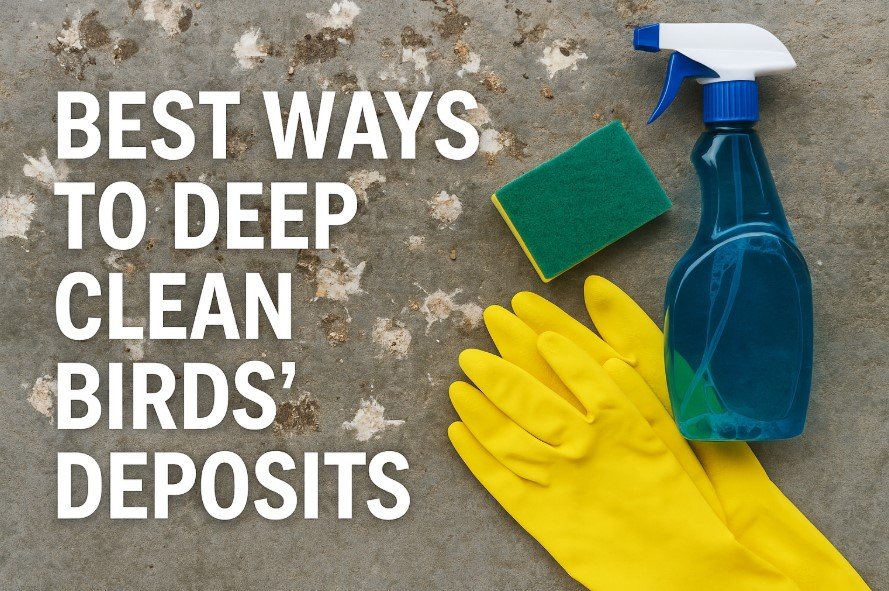Home Improvement
What Are the Best Ways to Deep Clean Birds’ Deposits?

Bird care is more than providing food and shelter; it also means cleaning up their mess. Cages, coops, and aviaries accumulate droppings and other waste over time, resulting in foul odors and potentially harming the health of everyone around. Deep cleaning is more than a mice clean-up at best; it also helps to keep the environment comfortable and safe for both birds and caretakers. Deep cleaning may sound daunting for those new to bird care, but it can be an easy task if approached with a strategy. This article will cover the best methods for deep cleaning bird deposits.
Why Deep Cleaning Matters
Although bird droppings may be relatively harmless by themselves, over time, they can be home to bacteria, fungi, and parasites. These contaminants can cause illness in and spread through birds and even in humans. Additionally, as droppings continue to accumulate, they increase odors, further contributing to the discomfort of the living space. By regularly deep cleaning an area, you ensure that the living space is safe and healthy. You can reduce risks of illness, improve odors, and create a genuinely healthier environment for all. It can help birds feel more natural while also supporting natural behavior when they can do things like perch, dust bathe, and attempt to nest.
Gathering the Right Tools
Before you begin cleaning, you’ll want to prepare the tools and materials. You will need a strong brush, scraper, an animal-friendly disinfectant, gloves, and a mask. You’ll need a couple of buckets of warm water, and you’ll also have some absorbent materials like old towels or rags. If you’re moving to a bigger space, you may want to buy or rent a pressure washer. Just be sure that all the birds have been removed prior to cleaning. Having the right tools prepared will save time and be ten times more efficient. The best preparation means a thorough cleaning without stress for you or your birds.
Removing Surface Waste First
The first step in any deep clean is removing loose waste. Scraping droppings off perches, walls, and floors clears the way for disinfecting later. This is especially important with chicken poop, which can stick firmly to surfaces if left too long. Focus on high-traffic areas where birds roost, feed, or spend most of their time. These spots usually collect the most deposits. Clearing away the bulk of the mess makes it easier for cleaning solutions to penetrate and do their job effectively.
Soaking and Scrubbing for Stubborn Deposits
Some droppings harden and become difficult to remove. In these cases, soaking the area with warm water or a safe cleaning agent will help loosen the buildup. After a few minutes, scrubbing with a stiff brush will usually lift the waste. Always choose cleaning products that are safe for birds. Avoid using harsh chemicals like bleach unless rinsed well afterward. Residues may harm the delicate respiratory system of birds. The objective is to remove the waste built up while not adding additional hazards to the space where the birds will continue to live.
Drying the Area Thoroughly
Moisture left behind after cleaning can quickly cause problems. Damp surfaces encourage mold and bacteria growth, undoing much of your hard work. Use towels, fans, or natural sunlight to dry the housing completely before birds return. Ensuring the space is fully dry also makes it more comfortable for the flock. Dry floors and perches reduce the risk of foot problems, and a well-ventilated area keeps air fresh. Drying is the final step that locks in the benefits of your deep clean.
Setting a Regular Cleaning Schedule
Deep cleaning isn’t a one-time job. Regular maintenance helps prevent waste from becoming unmanageable. Depending on flock size and housing design, a deep clean may be needed monthly, with smaller cleanups weekly. For poultry owners, keeping on top of chicken poop reduces odor and protects bird health. Creating a calendar for cleaning tasks ensures nothing is overlooked. Consistency is key to maintaining long-term hygiene and making each deep clean easier.
Avoiding Buildup Between Cleans
The best way to make deep cleaning a little easier is to avoid heavy buildup in the first place. The use of absorbent bedding, droppings boards under perches, and prompt waste removal will be helpful. Even simple habits like spot cleaning daily will reduce the time required for the major undertaking. However, preventing waste with consistent deep cleaning will create an environment conducive to bird and other occupant health, in addition to reducing odors and supporting less effort.
Deep cleaning bird waste is part of good bird care responsibilities. From removing surface residue to scrubbing down and disinfecting, drying, conditioning, and reproducing the cycle is all essential to cleaner and healthier living spaces for the birds. They will dwell in more comfortable environments, and caretakers will enjoy and benefit from cleaner and fresher spaces to work in.
With good tools, safe products, and continual repetition, deep cleaning is not overwhelming. Good waste management practices in determining chicken poop is truly one of the simplest methods for health and care for your birds. Clean your house, and provide a happy environment for your birds to thrive.
-

 Entertainment1 month ago
Entertainment1 month ago123Movies Alternatives: 13 Best Streaming Sites in 2026
-

 Entertainment2 months ago
Entertainment2 months ago13 Free FMovies Alternatives to Watch Movies Online in 2026
-

 Entertainment1 month ago
Entertainment1 month ago13 Flixtor Alternatives to Stream Free Movies [2026]
-

 Entertainment1 month ago
Entertainment1 month agoGoMovies is Down? Here are the 11 Best Alternatives






